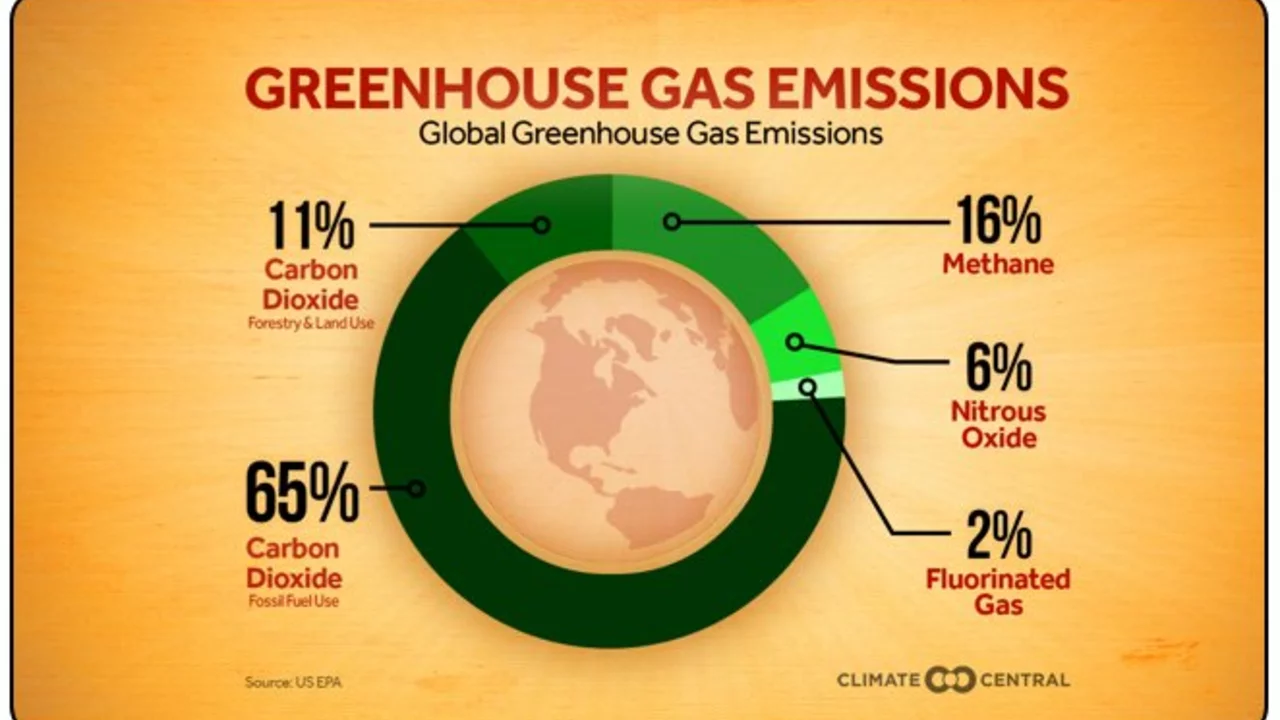Understanding the Basics: What is Methane?
Before diving into why methane is such a problem as a greenhouse gas, it's important to first understand what methane is. Methane, CH4, is a colorless, odorless gas that is naturally present in the atmosphere. It's the main component of natural gas and is used as a source of energy in many parts of the world. Methane is emitted by natural processes such as decomposition of organic materials in wetlands, but it's also released by human activities like fossil fuel extraction and livestock farming.
Despite being less abundant in the atmosphere than carbon dioxide (CO2), methane is a more potent greenhouse gas. It's able to trap significantly more heat, making it a major player in global warming. But why is this the case? That's what we'll explore in the following sections.
The Greenhouse Effect: How Methane Warms the Planet
Greenhouse gases like methane and CO2 keep our planet warm by trapping heat from the sun in the Earth's atmosphere – a phenomenon known as the greenhouse effect. While this effect is necessary for life on Earth, an excess of these gases can lead to an increase in the Earth's temperature, resulting in global warming and climate change.
Despite methane being far less prevalent in the atmosphere than CO2, it's much more efficient at trapping heat. In fact, the Intergovernmental Panel on Climate Change (IPCC) states that methane is over 25 times more potent than CO2 at trapping heat over a 100-year period. This means even small increases in methane levels can have a big impact on global warming.
Methane Emissions: Natural vs Human Sources
Methane is emitted by both natural and human sources. Natural sources include wetlands, termites, and the ocean, which collectively account for about 36% of methane emissions. The remaining 64% comes from human activities, primarily agriculture, waste management, and fossil fuel industries.
The problem is that human-induced methane emissions have been increasing dramatically over the past century. This is largely due to the rise in fossil fuel use, deforestation, and intensive farming practices. If we continue on this path, methane levels will continue to rise, exacerbating global warming and climate change.
The Impact of Methane on Climate Change
As we've explored, methane is a very potent greenhouse gas, which means it plays a significant role in climate change. Higher levels of methane in the atmosphere lead to an increase in the Earth's temperature, which can have devastating effects on our planet. This includes rising sea levels, more frequent and severe weather events, and shifts in plant and animal habitats.
Moreover, climate change can create a vicious cycle where warming temperatures lead to more methane emissions. For example, as permafrost in the Arctic thaws due to global warming, large amounts of methane trapped in the ice are released into the atmosphere, further accelerating global warming.
The Role of Human Activities in Methane Emissions
Human activities are the main driver of the increase in methane levels in the atmosphere. The extraction and burning of fossil fuels, such as coal, oil, and natural gas, are major sources of methane emissions. Similarly, agriculture contributes to methane emissions through livestock farming. The digestive processes of ruminant animals like cows and sheep produce methane, which is then released into the atmosphere.
Waste management is another significant source of methane emissions. When organic waste decays in landfills, it produces methane. If not captured and used for energy, this methane is released into the atmosphere, contributing to global warming.
Addressing the Methane Problem: Mitigation Strategies
While the problem of methane as a greenhouse gas is serious, there are strategies we can implement to reduce its impact. These include improving waste management practices, changing agricultural practices, and transitioning to renewable energy sources. Additionally, methane captured from landfills and coal mines can be used for energy, reducing the need for fossil fuels.
Finally, policy and regulation also play a crucial role in addressing the methane problem. Governments around the world need to implement and enforce policies that reduce methane emissions, while also incentivizing practices that mitigate the production of this potent greenhouse gas. It's clear that addressing the methane problem is not just an environmental issue, but also an economic and social one.
